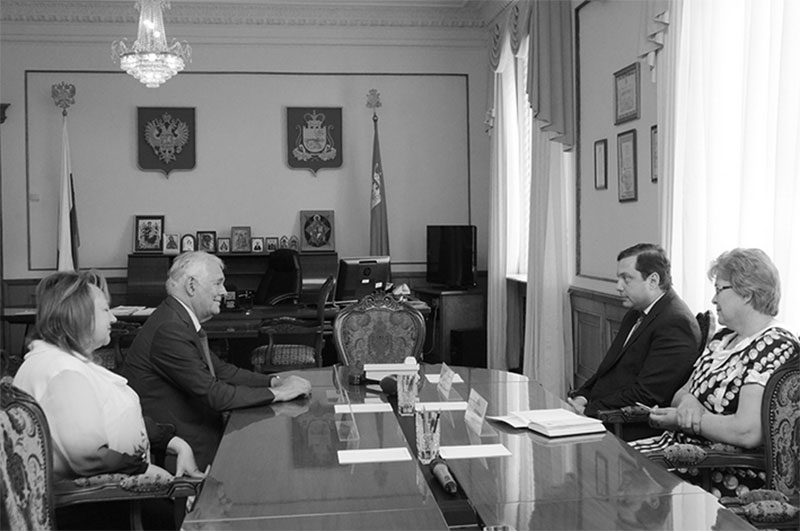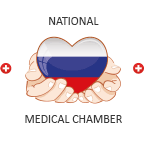Independent medical examination
The NMC is currently implementing a pilot project related to independent medical examination (IME) in order to build a legal, methodological and infrastructural framework for establishing this institution. The IME-establishing task is solved by the Federal Law 323-FZ On the Fundamentals of Public Health Protection in Russia (Art.58) as well as by the development of self-regulation of the healthcare industry. Amongst others, this solution prescribes the assessment of healthcare services in case of adverse outcomes as a method for resolving disputes between HCPs and patients, including pre-court resolution. Under this project, IME centers will be built in three pilot regions (Moscow, Smolensk and Lipetsk). The IME conducted by the NMC will beused for public control of healthcare outcomes and become a significant part of pre-court resolution of disputes between HCPs and patients (hereinafter, disputes).

Leonid Roshal and Governor Alexey Ostrovsky
Medical aid is one of the most important influencers on public health. The new law On the Fundamentals of Public Health Protection in Russia enacted on 1 January 2012 paved the way to the resolution of disputes related to the quality of healthcare services. Art.58 (item 1) grants the right to carry out IME according to the procedure and in cases stipulated by a Regulation on IME, which is to be approved by the Russian government. However, the regulation does not yet exist.
Since 1994-1995 Russia has only been implementing primary control over healthcare services under compulsory medical insurance, the most mass-scale delivery of medical services.
According to the NMC experts, the current assessment of medical services lacks independence, which stems from the deficiencies in the healthcare system,with another issue being the lack of mechanisms for pre-court dispute resolution.
Legal flaws in the compulsory health insurance make it impossible to solve issues related to IME in the territorial entities of Russia, should healthcare services be delivered by republican, regional or territorial medical establishments. In such cases, independence of medical examination cannot be ensured as specialists included into the territorial registers of healthcare quality experts of the relevant constituent entity withdraw their candidacies since they have to report to the independent chief professional working in the audited republican, regional or territorial medicinal establishment. Independent experts exclude pathologists from the trusted circle of specialists due to the strict administrative subordination of the morbid anatomy department to the management of the medical establishment in which poor quality medical services have been provided.Because of this,relatives of deceased patients request forensic examination. However, they cannot trust the forensic examination either due to the similar official subordination of medical forensic experts to the medical governing body of the relevant territorial entity, i.e. the local health minister.
Today, the Russian healthcare system has no mechanisms fo rpre-court resolution of disputes related to poor quality of healthcare services. According to the NMC experts, no other dispute resolution mechanism exists apart from initiating a civil or criminal case. Insurance companies prefer to go for pre-court resolution while medical establishments seem to be unprepared for this—they would rather initiate a criminal proceeding against their HCP in order to reduce the costs. The NMC experts believe that medical establishments are not willing to accept pre-court dispute resolution even in case of acknowledging the errors because they have no expense line in their cost structure to compensate for such damage. In this case, management of such medical establishments claimsthe compensation can only be paid out upon an execution writ.
Other countries have fair examination of healthcare services and dispute resolution fine-tuned. These countries have special committees under professional medical organizations in place to review issues related to adverse outcomes of healthcare services. These are the bodies that determine whether or not an HCP is responsible for the outcomes. Their independent resolutions serve as a cause for action and become the basis for pre-court dispute resolution.
Thus, the healthcare system and the society urgently need to have public expert control improved, and a system for pre-court dispute resolution established, especially in the light of active development of self-regulation in the healthcare industry.
